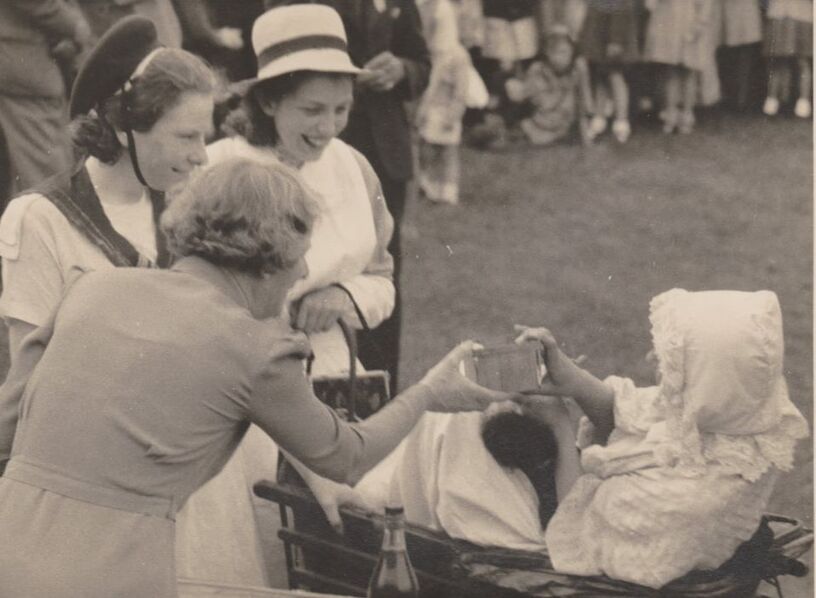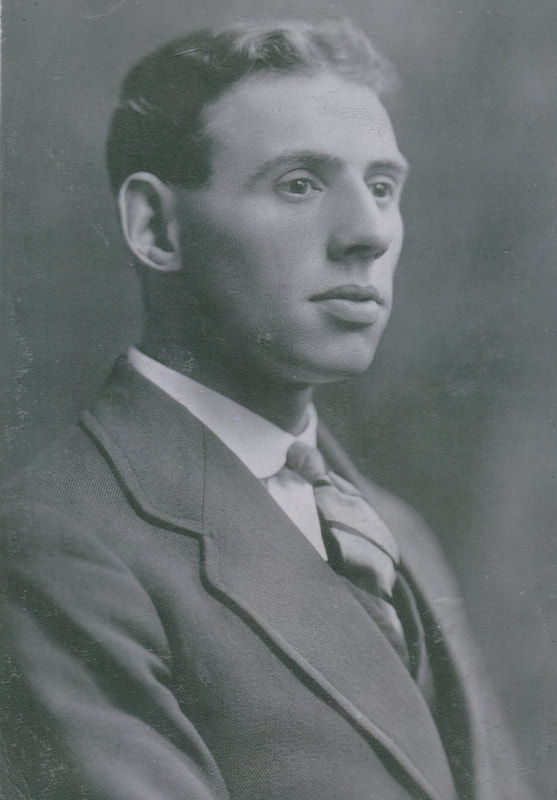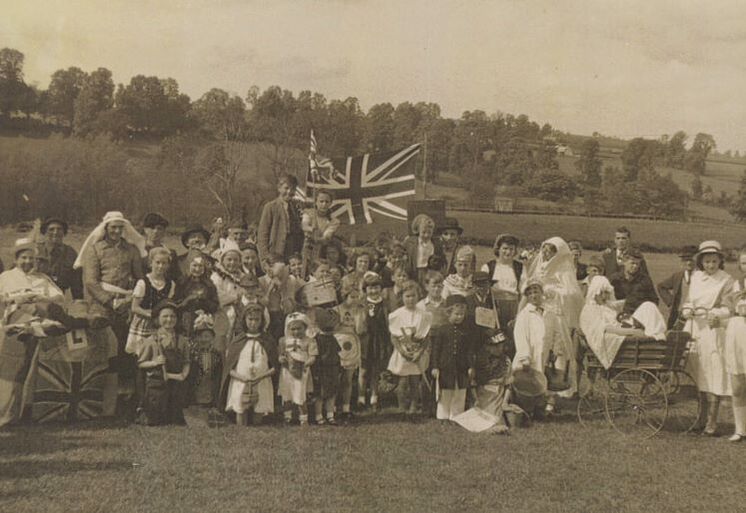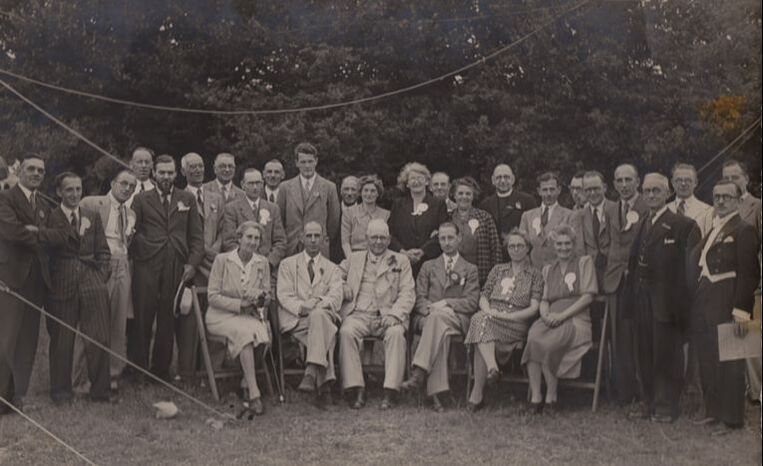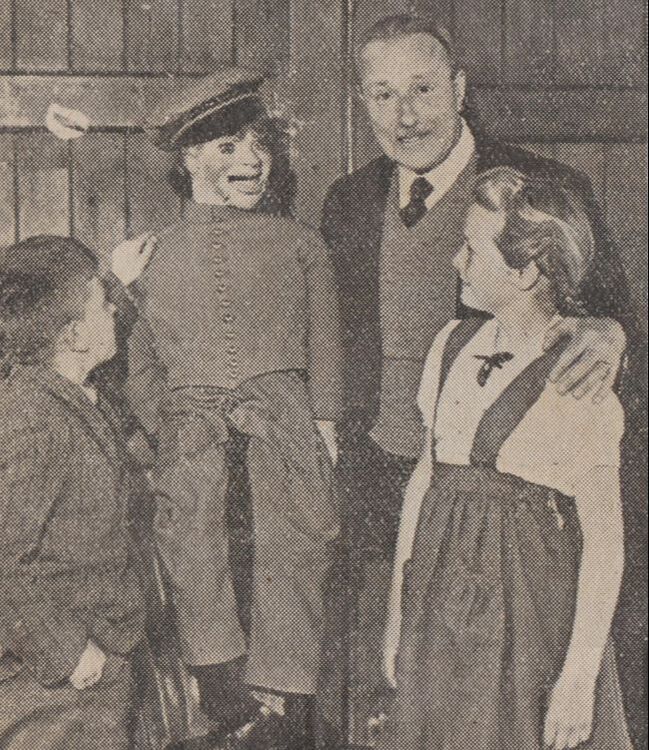VE Day Celebrations 1945 Alan Payne, April 2020, Research & photos Anne & Jim Browning and Genevieve Brunt
On 8 May 2020 Britain commemorates the 75th anniversary of the end of the Second World War against Nazi Germany.
Unfortunately modern commemorations have been cancelled due to coronavirus but this article records events in Box in 1945.
Unfortunately modern commemorations have been cancelled due to coronavirus but this article records events in Box in 1945.
In June 1945, Rev Arthur Maltin spoke about his relief that the war was coming to an end: May was a wonderful month. The War in Europe ended after five years and eight months. It was difficult to realise that it was over and we had won. Our heartfelt gratitude was shown in different ways. Some just breathed a deep sigh of relief; others let off steam by making merry; and there were many who had lost those dear to them who shed a silent tear.[1] He expressed the views of most people.
Victory in Europe, 8 May 1945
Victory in Europe was declared on Tuesday 8 May 1945 when Germany unconditionally surrendered to the Allies following Hitler’s suicide a week before. Crowds gathered in Trafalgar Square, London, to cheer the royal family and Prime Minister Winston Churchill. But the war wasn’t over and as Churchill declared on the wireless that afternoon: We may allow ourselves (only) a brief period of rejoicing (as Japan) remains unsubdued. Victory over Japan didn’t happen until 15 August 1945.
Victory in Europe, 8 May 1945
Victory in Europe was declared on Tuesday 8 May 1945 when Germany unconditionally surrendered to the Allies following Hitler’s suicide a week before. Crowds gathered in Trafalgar Square, London, to cheer the royal family and Prime Minister Winston Churchill. But the war wasn’t over and as Churchill declared on the wireless that afternoon: We may allow ourselves (only) a brief period of rejoicing (as Japan) remains unsubdued. Victory over Japan didn’t happen until 15 August 1945.
|
Organising VE Day in Box
Box’s VE Day celebrations were organised at almost a moment’s notice ... when the news came through on a wireless set. Despite being expected for some days as individual German forces surrendered, nothing could be arranged until the news finally emerged. Box organised two days of commemorations with celebrations on 8 May and a procession on VE Day Plus 1 on 9 May. A more sanguine period of reflection and prayer was held at Box Church and the War Memorial on 8 May. Arrangements were coordinated by James Browning, pictured, who acted as the treasurer, and Cecil Fildes who was secretary for the event. The programme of events was thrown together by a small group of local people including Harry Miller who provided transport facilities. Norman Martin did the electricals and the lighting, and Mrs Crowdy and Mr G Abrahams arranged gifts for the children and prizes for contest winners. The parish magazine described the event: The village celebrations were wonderful... VE Day and the following day were carried through in the best of spirits and everyone who could contributed to make it a success. The schoolchildren’s choir sang, the King’s speech was relayed on tannoy, and there was a fete, bonfire, fireworks display and dancing until after midnight on the cricket pitch to the accompaniment of wireless music. |
Box’s VE Day Celebrations
There are still residents alive who remember the events from 75 years ago. Here is the story of these events from a few of them.
There are still residents alive who remember the events from 75 years ago. Here is the story of these events from a few of them.
Anne Pothecary (nee Browning) Recalled:
It was a rather improvised event in the years of deep austerity. Mrs Jo Ody suggested that our family could borrow an old pram which was in the stables at Slades. Sixteen-year-old Anne Browning volunteered to be the baby and was wedged into the pram. Station-master Wilf Clothier did most of the pushing which was very difficult because the pram had metal wheels and didn’t like steps. Jean Richards played the part of the nanny and Ruth and Mrs Maltin are seen admiring me Anne Browning in the headline photograph. For all this effort, we received third prize, which was half a dozen eggs.
Genevieve Horne (nee Brunt) Recalled VE Day plus 1:
Local people in fancy dress processed from the Lower Rec field, to Mill Lane, then Fairfield (now developed as Bargates) and back via The Ley. Back on the Recreation Field, the Pioneer Corps held a Sports event where almost the entire population of the village gathered. Later in the afternoon, fancy dress prizes were awarded. Stanley Brunt, dressed up in a kilt, won the “owner of nice knobbly knees contest”, Kate Garland won first prize as “Departed Spirit” and Tim Brunt won the boys first prize as a Pearly King. Edwina Brunt was a coster (street seller).
The entertainment continued into the evening. Edwina performed a comedy dance and fling at the Old Folk's Party organised by the Women's Institute in the Bingham Hall to which convalescent soldiers had also been invited.
VE Sunday 13 May
Thanksgiving services were held on both Tuesday 8 May and the following Sunday. It was estimated that seven hundred people tried to attend at 11am on Sunday 13 May and Leslie Bence and Mr Fortune of the Admiralty organised a loud speaker to relay the service to the congregation who had to be seated outside in the churchyard. Those outside had the service interrupted by several military planes which were still flying overhead and blotted out the words of the service. Then there was a silent procession to the War Memorial for those who wanted. Arthur Weeks played Last Post.
More was planned, especially after 18 June 1945 when the demobilisation of the armed forces began. Particular attention was given to the wellbeing of local children who had been without a headmaster at Box School since HA Druett’s absence through illness in November 1944 and the appointment of Mr Adams on 16 June 1945.
It was a rather improvised event in the years of deep austerity. Mrs Jo Ody suggested that our family could borrow an old pram which was in the stables at Slades. Sixteen-year-old Anne Browning volunteered to be the baby and was wedged into the pram. Station-master Wilf Clothier did most of the pushing which was very difficult because the pram had metal wheels and didn’t like steps. Jean Richards played the part of the nanny and Ruth and Mrs Maltin are seen admiring me Anne Browning in the headline photograph. For all this effort, we received third prize, which was half a dozen eggs.
Genevieve Horne (nee Brunt) Recalled VE Day plus 1:
Local people in fancy dress processed from the Lower Rec field, to Mill Lane, then Fairfield (now developed as Bargates) and back via The Ley. Back on the Recreation Field, the Pioneer Corps held a Sports event where almost the entire population of the village gathered. Later in the afternoon, fancy dress prizes were awarded. Stanley Brunt, dressed up in a kilt, won the “owner of nice knobbly knees contest”, Kate Garland won first prize as “Departed Spirit” and Tim Brunt won the boys first prize as a Pearly King. Edwina Brunt was a coster (street seller).
The entertainment continued into the evening. Edwina performed a comedy dance and fling at the Old Folk's Party organised by the Women's Institute in the Bingham Hall to which convalescent soldiers had also been invited.
VE Sunday 13 May
Thanksgiving services were held on both Tuesday 8 May and the following Sunday. It was estimated that seven hundred people tried to attend at 11am on Sunday 13 May and Leslie Bence and Mr Fortune of the Admiralty organised a loud speaker to relay the service to the congregation who had to be seated outside in the churchyard. Those outside had the service interrupted by several military planes which were still flying overhead and blotted out the words of the service. Then there was a silent procession to the War Memorial for those who wanted. Arthur Weeks played Last Post.
More was planned, especially after 18 June 1945 when the demobilisation of the armed forces began. Particular attention was given to the wellbeing of local children who had been without a headmaster at Box School since HA Druett’s absence through illness in November 1944 and the appointment of Mr Adams on 16 June 1945.
Left to Right: Back Row: Messrs Couzens, E Cox, Bezant, Mays, Cogswell, G Abrahams, Rev AF Maltin, Williams, L Bence, W Clothier
Middle Row: C Lancaster, B Swan, W Dermott, Bradfield, C Lambert, A Adams, Burningham, Baxter, Burton, H Miller,
RW Chaffey, L Butt, Mr Hayward, Chapman Webb
Seated: Mrs Crowdy, J Browning, CW Oatley, CH Fildes, Mrs Dermott, Mrs Holmes (courtesy Anne Browning)
Middle Row: C Lancaster, B Swan, W Dermott, Bradfield, C Lambert, A Adams, Burningham, Baxter, Burton, H Miller,
RW Chaffey, L Butt, Mr Hayward, Chapman Webb
Seated: Mrs Crowdy, J Browning, CW Oatley, CH Fildes, Mrs Dermott, Mrs Holmes (courtesy Anne Browning)
Welcome Home and Peace Commemoration Fete, 6 August 1945
Because most soldiers were abroad, a few weeks later there were more celebrations with a joint carnival and fete by the Welcome Home committee and Peace Commemoration organisation on August Bank Holiday.[2] Parish chairman Charles Oatley presided and James Browning and Cecil Fildes took the same duties as in May. Mrs E Holmes ran the Welcome Home Committee. The events were partly a fundraiser and the Box Pantomime group went around Kington St Michael, Calne and Corsham Court putting on theatrical shows in the summer of 1945. The funds were allocated two-thirds for a village peace memorial and one-third to the Welcome Home Fund Committee. It was decided that any memorial should be non-military and, in the event, an old stable barn opposite the Queen’s Head was converted into lavatories for the benefit of villagers (now called The Old Sweet Factory).
Mr Chapman Webb organised the procession which started in Henley Lane, down to the old Fete Field, to the War Memorial, Box High Street, the Market Place, the Bassetts and the Recreation Field. The weather was inclement and the children from Hawthorn were taken by char-a-banc to Box Halt, where they assembled and processed directly to the Recreation Field.
Because most soldiers were abroad, a few weeks later there were more celebrations with a joint carnival and fete by the Welcome Home committee and Peace Commemoration organisation on August Bank Holiday.[2] Parish chairman Charles Oatley presided and James Browning and Cecil Fildes took the same duties as in May. Mrs E Holmes ran the Welcome Home Committee. The events were partly a fundraiser and the Box Pantomime group went around Kington St Michael, Calne and Corsham Court putting on theatrical shows in the summer of 1945. The funds were allocated two-thirds for a village peace memorial and one-third to the Welcome Home Fund Committee. It was decided that any memorial should be non-military and, in the event, an old stable barn opposite the Queen’s Head was converted into lavatories for the benefit of villagers (now called The Old Sweet Factory).
Mr Chapman Webb organised the procession which started in Henley Lane, down to the old Fete Field, to the War Memorial, Box High Street, the Market Place, the Bassetts and the Recreation Field. The weather was inclement and the children from Hawthorn were taken by char-a-banc to Box Halt, where they assembled and processed directly to the Recreation Field.
|
The big attraction was Charles B Cochran, the world-famous stage producer, who had produced Noel Coward plays in the 1920s and 1930s and theatre in America, who agreed to open the Box celebrations. He had an incentive because he wanted to see his friend the actress Maisie Gay. She lived at Whirligig, Box but was seriously ill and he wished see her before it was too late. One of his duties was to judge the ladies’ beauty competition. It was claimed that five thousand people attended the celebrations on Fete Field, the last event ever held there before Bargates housing estate was built.
Villagers made a determined effort to celebrate. Mr J Reed of Northey Arms organised the refreshment tent and the Women's’ Institute ran a lemonade stand. A Rabbit and Poultry Show was organised by Box Hill Rabbit Club, and the Bath Imperial Spa Band played from 1pm until midnight. Some events spilled over into local halls. Oscar Drew Harris put on a ventriloquist show in the Bingham Hall with his puppet Shakespeare, assisted by Pauline Hutton. Dancing from 9pm until midnight featured Box's Own Victory Song "For ever and a Day", words and music composed by Marjorie Haywood of the Queen's Hotel and sung by Betty Franklin. |
Conclusion
On 15 August 1945 the war was officially over when VJ Day (Victory over Japan) was declared following the surrender of the Emperor after the nuclear bombing of Hiroshima and Nagasaki. It wasn’t the end of austerity with few eggs, no bananas and people instructed to limit bath water to 5 inches. The post-war principles put forward in the Beveridge Report of 1942 were the core of our values, accepted by all political sides. With great insight, the economist William Beveridge listed Britain’s needs as:
On 15 August 1945 the war was officially over when VJ Day (Victory over Japan) was declared following the surrender of the Emperor after the nuclear bombing of Hiroshima and Nagasaki. It wasn’t the end of austerity with few eggs, no bananas and people instructed to limit bath water to 5 inches. The post-war principles put forward in the Beveridge Report of 1942 were the core of our values, accepted by all political sides. With great insight, the economist William Beveridge listed Britain’s needs as:
- Want (poverty)
- Ignorance (lack of education and training)
- Squalor (poor housing and homelessness)
- Idleness (unemployment)
- Disease (inadequate health care)
References
[1] Parish Magazine, June 1945
[2] Parish Magazine, June 1945
[1] Parish Magazine, June 1945
[2] Parish Magazine, June 1945
